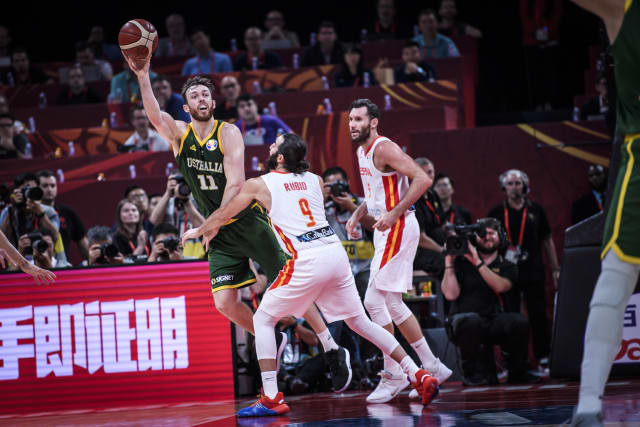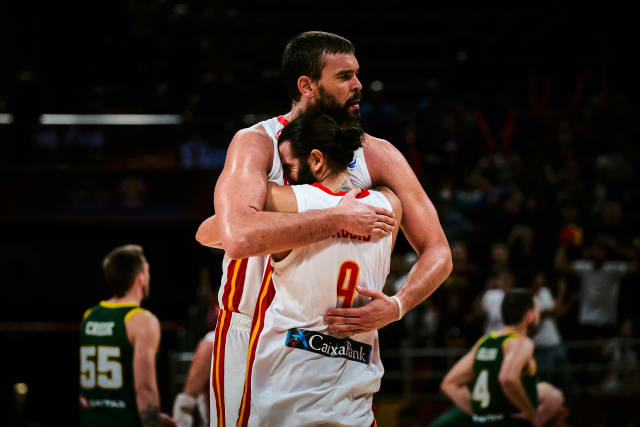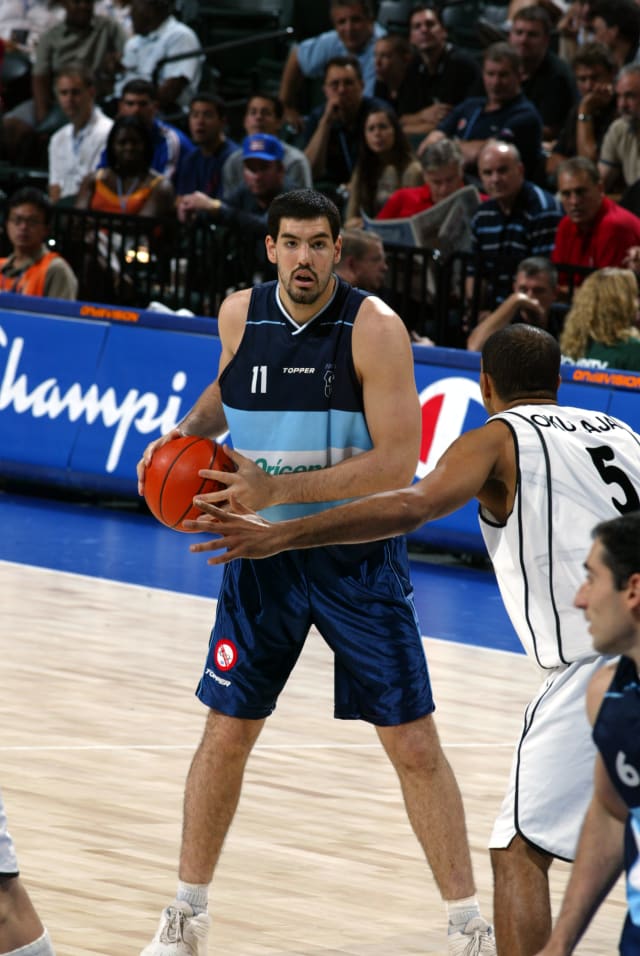The Best of 2019 World Cup: Spain become fifth nation with multiple trophies
Spain became the fifth nation to win multiple titles as the Europeans went undefeated at the FIBA Basketball World Cup 2019. They were joined on the podium in China by Argentina and France.
MIES (Switzerland) - Spain became the fifth nation to win multiple titles as the Europeans went undefeated at the FIBA Basketball World Cup 2019. They were joined on the podium in China by Argentina and France.
The Spanish, who also won in 2006, dominated the field, which was expanded for the first time to 32 teams. Argentina collected their first medal since finishing second in 2002, and France took third place for a second consecutive World Cup.
The reigning champions USA were bounced in the Quarter-Finals, missing out on the podium for the first time since 2002 and just the second time in the last 10 editions.
The best team: Spain
| Rank | Team | W-L |
| 1. | Spain | 8-0 |
| 2. | Argentina | 7-1 |
| 3. | France | 6-2 |
| 4. | Australia | 6-2 |
| 5. | Serbia | 6-2 |
| 6. | Czech Republic | 4-4 |
| 7. | USA | 6-2 |
| 8. | Poland | 4-4 |
| 9. | Lithuania | 3-2 |
| 10. | Italy | 3-2 |
| 11. | Greece | 3-2 |
| 12. | Russia | 3-2 |
| 13. | Brazil | 3-2 |
| 14. | Venezuela | 2-3 |
| 15. | Puerto Rico | 2-3 |
| 16. | Dominican Republic | 2-3 |
| 17. | Nigeria | 3-2 |
| 18. | Germany | 3-2 |
| 19. | New Zealand | 3-2 |
| 20. | Tunisia | 3-2 |
| 21. | Canada | 2-3 |
| 22. | Turkey | 2-3 |
| 23. | Iran | 2-3 |
| 24. | China | 2-3 |
| 25. | Montenegro | 1-4 |
| 26. | Korea | 1-4 |
| 27. | Angola | 1-4 |
| 28. | Jordan | 1-4 |
| 29. | Cote d'Ivoire | 0-5 |
| 30. | Senegal | 0-5 |
| 31. | Japan | 0-5 |
| 32. | Philippines | 0-5 |
After two FIBA Basketball World Cups in Europe, FIBA awarded the 2019 edition to China - the third tournament in Asia following 1978 in Philippines and 2006 in Japan. The games were played from August 31 to September 15 in Beijing, Dongguan, Foshan, Guangzhou, Nanjing, Shanghai, Shenzhen and Wuhan with the Semi-Finals and medal games taking place in Beijing.
Following three World Cups with 24 teams, China 2019 brought together 32 nations. The 2019 World Cup was also the first following the Competition Format change to have teams secure spots through continental qualifiers through in-season FIBA Windows starting in November 2017.
The 32 teams consisted of hosts China; 12 teams from Europe's qualifiers (Spain, Lithuania, Greece, Turkey, Italy, Russia, Germany, Montenegro, Poland, Czech Republic, Serbia); 7 nations from Asia & Oceania (New Zealand, Australia, Korea, Japan, Jordan, Iran, Philippines); 7 teams from the Americas (USA, Canada, Argentina, Venezuela, Puerto Rico, Brazil, Dominican Republic); and 5 countries from Africa (Tunisia, Nigeria, Angola, Senegal, Cote d'Ivoire). Montenegro and the Czech Republic were making their World Cup debuts.
The 32 teams were broken down into eight groups of four with round-robin format. The top two finishers advanced to a second group phase with the bottom two dropping to Classification 17-32 action. The two best finishers in the second group stage moved on to the Knockout Phase starting with the Quarter-Finals.
All eight first-round groups had undefeated teams and a second-place finisher with two wins. Poland went 3-0 in Group A in their first World Cup since 1967 and Venezuela eliminated hosts China for second place. Argentina and Russia advanced from Group B with Spain and Puerto Rico moving on from Group C, and Serbia and Italy taking the top two spots in Group D.
In Group E, United States went through with Czech Republic, who surprised Turkey, who had tested USA in an overtime loss. Brazil and Greece finished one-two in Group F; and Group G had one of the biggest surprises with Dominican Republic upsetting Germany for second place behind France. And in Group H, Lithuania knocked off Canada to advance with table toppers Australia.
The Second Round Phase saw two more surprises. Poland defeated Russia to take second place behind Argentina in Group I; and Czech Republic beat Brazil by 22 points to put them on top of a three-way tie at 3-2 for second place behind USA in Group K ahead of Greece and Brazil.
Spain and Serbia prevailed in Group J ahead of Italy and Puerto Rico, and Australia and France finished one-two in Group L ahead of Lithuania and Dominican Republic.
The Quarter-Finals started with Argentina using a late run to pull away from Serbia 97-87 before Spain ended Poland's inspiring run 90-78.
Day 2 of the Quarter-Finals saw the champs go down as France defeated two-time reigning champions USA 89-79 to reach the Semi-Finals. For the first time since 2002, USA did not reach the podium and they lost their first World Cup game since 2006, snapping a 48-game winning streak. France's opponent in the Semis was Australia, who defeated the Czech Republic 82-70.
The Semi-Finals provided even more drama, starting with Spain needing double overtime to fend off Australia 95-88 to get back to the Final after two straight Quarter-Finals exits. It was the first double-OT game in the Knockout Phase in World Cup history. Spain's opponent was Argentina, who ended France's dreams of a first title with an 80-66 win, thanks to the ageless Luis Scola picking up 28 points and 13 rebounds.
France would get back to the third spot on the podium in a second straight tournament as they defeated Australia 67-59 - the Oceanian powers in the top four for the first time at the World Cup.
In the Final, Spain proved too much for Argentina, opening a 12-point lead early in the second quarter and never looking back for a 95-75 win. Ricky Rubio scored 20 points with 7 rebounds, Marc Gasol tallied 14 points, 7 rebounds, 7 assists, and 3 blocks and Rudy Fernandez contributed 11 points and 10 rebounds. Gabriel Deck picked up 24 points in the loss.
By adding the crown to their 2006 trophy, Spain became the fifth nation to win multiple titles, joining USA, Yugoslavia, Soviet Union and Brazil.
The best player: Ricky Rubio, MVP
Ricky Rubio was outstanding all tournament - playing in his third World Cup after 2010 and 2014. The Spanish playmaker averaged 16.4 points, 4.6 rebounds, 6.0 assists, and 1.5 steals while also shooting 39 percent from long range. He led the team in scoring and assists.
Rubio came out of the gates strong with 17 points and 9 assists in a win over Tunisia and followed that with 17 points, 8 rebounds, and 4 assists against Puerto Rico. His one subpar game came versus Iran as he totaled just 5 points though he chipped in 5 assists.
In the Second Round, Rubio scored 15 points as Spain beat Italy and then had 19 points, 5 rebounds, and 4 assists in a victory over Serbia. He flirted with a double-double in the Quarter-Finals against Poland with 19 points and 9 assists and then got his double-double in the double-overtime thriller against Australia in the Semi-Finals with 19 points and 12 assists to go with 7 rebounds and 4 steals. And in the Final, Rubio poured in 20 points and added 7 rebounds and 3 assists.
Over his career, Rubio became the only player to combine for 100+ assists and 50+ steals in the FIBA Basketball World Cup since 1994. By the tournament's end, Rubio totaled 130 assists in World Cup history, good enough to pass the previous assists leader, Pablo Prigioni of Argentina.
Rubio was joined on the All-Star Five by Spain teammate Marc Gasol, Luis Scola of Argentina, Evan Fournier of France and Serbia's Bogdan Bogdanovic.
The best game: Spain vs Australia , Semi-Finals
The first Semi-Final pitted European superpower Spain - hoping to grab a second world championship and reach the Final for a second time following 2006 - against Australia - who finally broke through to reach the top four for the first time following four previous top eight World Cup finishes. The Boomers had also three years earlier in 2016 come up empty-handed for the fourth time after reaching the Semi-Finals of the Olympics.
Juancho Hernangomez came out hot with eight points for an 11-6 lead for Spain. The rest of the first quarter was close throughout with six lead changes - the final coming on Sergio Llull's long buzzer-beater at the end of the first quarter and Spain were up 22-21.
Spain needed 4 minutes to finally score in the second quarter but Australia could only pull away to 27-22. The Boomers increased the lead to 8 points - 32-24 - and still led 37-32 at intermission.
 Nic Kay had his best game of the 2019 World Cup in the Semi-Finals
Nic Kay had his best game of the 2019 World Cup in the Semi-Finals
Patty Mills and Aron Baynes both hit three-pointers and Nic Kay continued his outstanding game to push the margin to 11 points - 50-39 - midway through the third quarter. Ricky Rubio stepped up with 6 points the rest of the quarter and the Europeans were down 55-51 after 30 minutes.
A veteran 34-year-old Andrew Bogut and Kay combined for 10 points to help keep Spain at an arm's length with a 67-60 cushion. Australia seemed poised to take another step and finally grab a medal, leading 70-65 after three Mills free throws with under 3 minutes to play.
But the Boomers offense failed to execute and Spain went ahead 71-70 on two Marc Gasol free throws with 8.7 seconds left. Mills had a chance to be the hero at the foul line with 4.7 seconds remaining but he missed the second free throw and the game went to overtime.
 Australia just could not stop Marc Gasol and Ricky Rubio
Australia just could not stop Marc Gasol and Ricky Rubio
Gasol scored the first 5 points of the extra session only to have Mills answer with 5 points of his own including two free throws with 14 seconds on the clock for a two-point lead. Gasol however kept his nerves and converted two more from the line with 4.6 ticks left and the game was extended 5 more minutes - the first time a World Cup knockout game went to double-overtime.
Bogut opened the second extra session but Llull made two three-pointers in a 10-0 run to put Spain ahead 90-82. Baynes and Mills both hit from deep to make it 93-88 inside the final minute but Gasol drained a jumper at the end of the shot clock to make it 95-88 and decide the game.
Gasol finished with 33 points while Rubio had 19 points, 12 assists, and 7 rebounds, and Llull pitched in 17 points. Mills tied for a 2019 World Cup-high 34 points in more than 45 minutes, Kay had 16 points, Bogut 12, and Joe Ingles was held to 4 points on 1-of-9 shooting but added 10 rebounds and 7 assists in the loss.
The biggest story: History-making Scola inspires Argentina to second place in fifth World Cup
Luis Scola was on the brink of turning 40 years old, but the Argentina living legend defied Father Time one more time at the World Cup and inspired his countrymen to second place in his fifth World Cup. The power forward made history along the way in China.
Scola, who would turn 40 in April 2020, scored 143 points and grabbed 65 rebounds in eight games, leading Argentina in scoring (17.9 points per game) and rebounding (8.1 rebounds per game) in a team-high 29.5 minutes. He added another major accomplishment to his illustrious career in Argentina's second game of the tournament, scoring 23 points against Nigeria to give him 611 points for his World Cup career. That allowed Scola to pass Andrew Gaze's 594 points and move into second place on the all-time World Cup scoring chart behind only the Brazilian great Oscar Schmidt's 906 points. Scola finished the tournament with 716 points.
OTD 2019 🗓️
— FIBA Basketball World Cup 2023 🏆 (@FIBAWC) September 2, 2022
The bucket that moved Luis Scola into #2 on the all-time men's scoring list, eventually finishing his decorated international career with 716 World Cup points.
🇧🇷 Oscar Schmidt 906
🇦🇷 Luis Scola 716
🇦🇺 Andrew Gaze 594#FIBAWC x #WinForAll pic.twitter.com/roTVZH3WF9
After reaching the 20-point mark just once in the first four games, the wily veteran stepped up his game starting in the final game of the second group stage. He scored 21 points in a win over Poland and then poured in 20 points as Argentina downed Serbia in the Quarter-Finals.
The Semi-Finals versus France was Scola's best game, hitting 8-of-17 shots and 9-of-10 free throws for 28 points to go along with 13 rebounds as the South Americans downed the Europeans to reach the Final. It only seemed fitting that Scola would guide Argentina back to the title game considering he did the same in his first World Cup in 2002 - when the team lost to Yugoslavia.
 Luis Scola at the 2002 World Cup
Luis Scola at the 2002 World Cup
Scola's inspiring play was not enough against Spain in the China 2019 Final though as he was limited to 8 points on 1-of-10 shooting though he did have 8 rebounds in a 95-75 loss. Still, Scola was named to the All-Star Five for his performance - a second time following 2010. Scola would lace them up one more time for Argentina at the 2020 Olympics, where they were bounced in the Quarter-Finals by Australia. Scola bid farewell to the Argentina national team in Tokyo but he will forever be remembered for his inspiring performance in China.
The best performance: GunA Ra
The leading scorer in the tournament was GunA Ra of Korea, who was one of the best players in China over the team's duration in the competition. Ra, born Ricardo Ratliffe, poured in 23.0 points per game and also led the World Cup in rebounds with 12.8 boards per contest. He also chipped in 1.8 assists, 1.4 steals and 1.2 blocks for Korea, who finished the tournament ranked 26th of 32 teams.
Ra started the tournament with his first of five double-doubles, picking up 31 points and 15 rebounds against Argentina. He followed that with 19 points and 10 rebounds in a loss to Russia. The center ended the first round with 18 points and 11 rebounds versus Nigeria.
In the Classification 17-32, Ra collected 21 points and 12 rebounds as Korea lost to China. But the big man poured in 26 points with 16 rebounds in Korea's sole win of the event over Cote d'Ivoire. Ra became the first player to register 15+ points and 10+ rebounds in four consecutive games during a single FIBA Basketball World Cup since 1994. He was also the only player to have registered double-doubles in all his World Cup games in China - that was five double-doubles.
Stats leaders
Points
| Player (country) | Points Per Game |
| GunA Ra (Korea) | 23.0 |
| Bogdan Bogdanovic (Serbia) | 22.9 |
| Corey Webster (New Zealand) | 22.8 |
| Patty Mills (Australia) | 22.8 |
| Dar Tucker (Jordan) | 21.0 |
Rebounds
| Player (country) | Rebounds Per Game |
| GunA Ra (Korea) | 12.8 |
| Hamed Ehaddadi (Iran) | 10.8 |
| Salah Mejri (Tunisia) | 10.2 |
| Rudy Gobert (France) | 9.1 |
| Giannis Antetokounmpo (Greece) | 8.8 |
| Jonas Valanciunas (Lithuania) | 8.8 |
Assists
| Player (country) | Assists Per Game |
| Dennis Schroder (Germany) | 9.4 |
| Tomas Satoransky (Czech Republic) | 8.5 |
| Facundo Campazzo (Argentina) | 7.8 |
| Gelvis Solano (Dominican Republic) | 6.6 |
| Scott Wilbekin (Turkey) | 6.5 |
FIBA